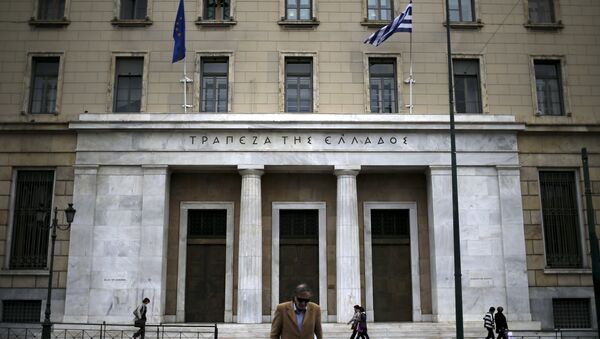The country's banking sector has been shaky since early September, but things worsened dramatically in early October. The four institutions suffered losses of up to 40 percent. Piräus Bank's share price dropped by almost 30 percent, and the Athens stock exchange index fell to its lowest level in the past 31 months.
How could that be? Hadn't Greece been released from the euro bailout in August, to the great applause of politicians? And didn't those four large banks pass the ECB stress test in May?
Stress test: ECB's PR tool
In fact, just six weeks ago EU Council President Donald Tusk on his Twitter account congratulated the Greek people for returning to international financial markets; and European Finance Commissioner Pierre Moscovici said that "it draws a symbolic line under an existential crisis." Less than half a year ago the ECB certified the four systemically important Greek banks to be able to survive severe turbulence without major damage.
Such tests are nothing more than an RP tool by which the ECB deceives the public about the true state of the financial system. Even if carried out with the utmost care and seriousness, their results would be largely useless for the following reason — more than 40 percent of today's banking transactions are carried out by unregulated shadow banks, mainly hedge funds.
Large banks have long since outsourced the riskiest part of their business to this area. Particularly, the trading of high-risk derivatives almost defies any regulation, since these are so-called "over-the-counter transactions" that aren't seen in the balance sheets. No wonder then that the results of these stress tests are basically worthless.
READ MORE: EU in Existential Crisis as Greece 'Formally' Exits Bailout Program — Professor
The crisis has passed? No way!
As far as Greece's release from the EU bailout is concerned, a glance at facts and figures is enough to deny the euphoria of EU bureaucrats. Greece has been able to overcome its problems three times since 2010, but that was only with outside help; the country's loans for eight years total €289 billion. The country's debt now accounts for around 180 percent of the GDP which is, by far, the highest in Europe.
READ MORE: Eurozone Financial Sector Braces for Spillovers From Turkey's Economic Woes
All this is nothing but a dubious juggling of numbers, hiding that Greece and its banks are already hopelessly bankrupt. Why? Because Greece's financial sector is part of the completely uncontrolled international financial casino; because bankruptcy would most likely lead to the collapse of the system as a result of the close links between Greek and foreign capital and the incalculable risks to the euro and derivatives.
Catastrophic prospects
How will it turn out? The Athens government is already working together with the ESM and the Greek banking association on an "intervention plan" meaning a classic bail-out with the help of EU taxpayers' money.
An EU-mandated bail-in (the involvement of shareholders and investors) doesn't appear to be under consideration because one fears the political and social consequences.
Greece's problems won't be solved in any case. But two things are already certain: the next aid payments will have to come, and to pay for that we have the Greek working class, 35 percent of whom are already at or below the poverty line, and the middle class that is now suffocated by a tax burden of up to 75 percent. As for pensioners, in January they're going to face the 23rd cut to their pensions, this time by 18 percent.
READ MORE: MF's Lagarde: Joint Eurozone Budget Should Be Conditional
No matter from where one looks at developments in Greece: this is nothing but a deliberate criminal delaying of bankruptcy in favor of the international financial industry and at the expense of the middle class and the most vulnerable sections of the population organized by the government in collaboration with the EU and ECB bureaucrats.
The views and opinions expressed in this article are solely those of the author and do not necessarily reflect those of Sputnik.





